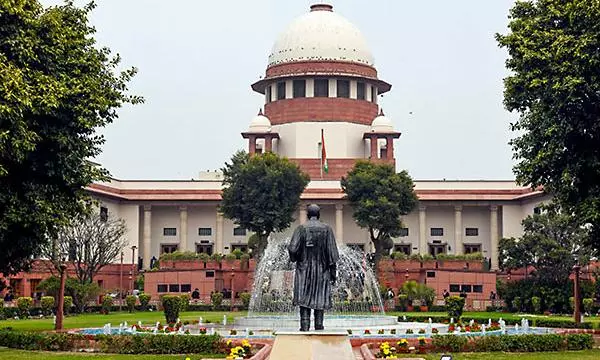
EVM-VVPAT case: ‘Can’t control elections’ says SC, reserves order
Apex court observes that there have been no reported incidents of any malware being loaded along with the symbol in the EVM used to cast votes

The Supreme Court on Wednesday (April 24) reserved its order on a batch of petitions seeking complete cross-verification of votes cast using Electronic Voting Machines (EVMs) with Voter Verified Paper Audit Trails (VVPATs).
Earlier in the day, Justice Dipankar Datta told noted senior lawyer Prashant Bhushan that the apex court cannot “control the elections” and or issue directions simply because doubts have been raised about the efficacy of EVMs.
The petitioners have claimed that the polling devices can be tinkered with to manipulate poll results.
The apex court said so far there have been no incidents where malicious programme has been loaded with the election symbol.
“Till date there is no report of any such incident (malicious programme being loaded along with the symbol). We cannot control the election Mr Bhushan, we cannot control another constitutional authority," Justice Datta observed.
“If there is room for improvement, we can certainly enhance it. The courts intervened twice: first, when we mandated the use of VVPAT, and second, when we increased the verification from one to five per cent," reassured Datta’s companion judge on the bench, Justice Sanjiv Khanna.
Debate on microcontrollers
The court also sought answers from an official of the poll panel to five questions related to the functioning of EVMs including whether the microcontrollers fitted in them are reprogrammable.
Senior Deputy Election Commissioner Nitesh Kumar Vyas, who had earlier made a presentation to the court on the functioning of EVMs, was summoned by the bench to appear at 2 pm to answer the queries.
Vyas, while responding to the question about microcontrollers, said they are one-time programmable at the time of manufacture and installed in all the three units of EVMs – the balloting unit, VVPAT and the control unit. They cannot be reprogrammed thereafter, he asserted.
Advocate Bhushan, appearing for petitioner NGO 'Association for Democratic Reforms', claimed the EC official's statement was not fully correct. He cited a report by a private body to back his contention.
“The report says that the kind of memory used in these three units can be reprogrammed. A malicious programme can easily be uploaded at the time of symbol loading," he claimed, adding efforts should be made to remove the doubts about the transparency of EVMs.
'Court will rely on data given by EC'
Justice Khanna told Bhushan that the court has to rely on the data and information provided by the EC, a constitutional body, which says the programme in the memory of an EVM can be written only once.
"If you are prejudiced or predisposed about something, then we cannot help it. We cannot change your thought process," the bench told Bhushan.
Justice Datta said, "Can we issue a mandamus (directions) on the basis of a suspicion? The report you (Bhushan) are relying on goes on to say that there is no incident of manipulation yet. We can't control the elections. We are not the controlling authority of another constitutional authority."
He told Bhushan that law will take care if something goes wrong with the voting machines. The bench recalled that the top court had in the past issued two orders on VVPAT, an independent vote verification system which enables electors to see whether their votes have been recorded correctly.
‘EC not a political party’
Justice Khanna said the EC has its own independent system, its own technical experts and it is not a political party.
During the hearing, Vyas told the court that microcontrollers installed in balloting unit, control unit and VVPAT cannot be accessed physically in any manner as there is a tamper detection feature which makes an EVM inoperative the moment anyone tries to open the machine.
Vyas said EVMs are stored for 45 days after the polling in conformity with the limitation period for filing an election petition under the Representation of the People Act.
"On the 46th day, the returning officer writes to the registrar general of the high court on whether any election petition has been filed. If the registrar general informs about filing of election petition, then EVMs of that constituency are sealed and preserved for future purpose," he said.
When senior advocate Santosh Paul, appearing for one of the petitioners, said that source code of EVMs should also be disclosed for transparency, the court rejected his contention, saying "No, the source code cannot be disclosed as there is a chance of it to be misused."
After a two-day hearing, the bench had on April 18 reserved its verdict on the pleas. However, the matter was listed again on Wednesday as the court wanted some clarifications from the EC.
NGO 'Association for Democratic Reforms' (ADR), one of the petitioners, has sought reversal of the poll panel's 2017 decision to replace the transparent glass on VVPAT machines with an opaque glass through which a voter can see the slip only when the light is on for seven seconds. The petitioners have also sought the court's direction to revert to the old system of ballot papers.
The seven-phase Lok Sabha polls began on April 19 and will conclude with the announcement of results on June 4.
(With inputs from agencies)

